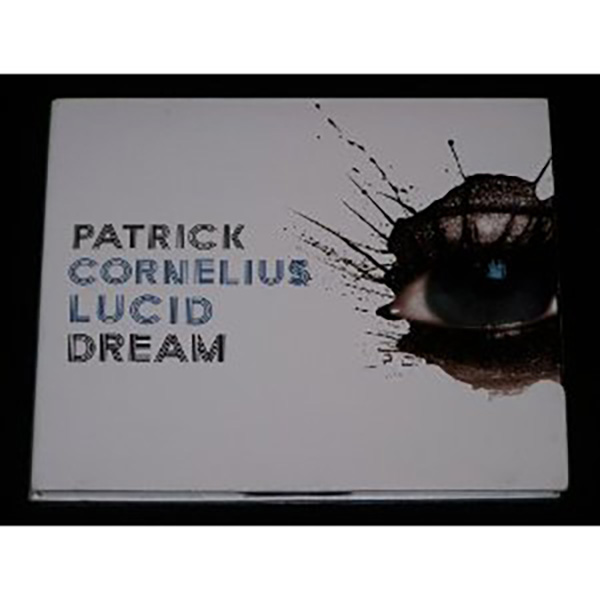
by Ian Mann
April 15, 2010
/ ALBUM
Solo debut from this New York based alto saxophonist, co-leader with bassist Michael Janisch of the acclaimed Transatlantic Collective.
Patrick Cornelius is an American alto saxophonist currently located in New York. With bassist Michael Janisch he co-leads the Transatlantic Collective, an exciting aggregation of American and European musicians. It was at the Collective’s Cardiff show last Autumn (see review elsewhere on this site) that Patrick gave me a copy of this CD for review purposes so my apologies to him for having not written about it before now.
“Lucid Dream” was recorded back in 2006 and still represents Cornelius’ début as a leader. The supporting cast features some of New York’s leading players and comprises of a core quartet with Aaron Parks on piano and Fender Rhodes, Sean Conley on double bass and Kendrick Scott on drums. Trombonist Nick Vagenas appears on four of the album’s nine tracks with vocalist Gretchen Parlato guesting on the closing “April Rain”. Both Parks and Parlato have gone on to greater fame since and reviews of their solo material (Parks’ “Invisible Cinema” and Parlato’s “In A Dream”) can be found elsewhere on this site.
The son of a US Airforce officer Cornelius led a peripatetic childhood including a spell in the UK. Initially a classically trained pianist he became fascinated with the saxophone as a teenager and almost inevitably names Charlie Parker as one of his principal influences, indeed there’s a version of a Parker tune, “Billie’s Bounce” on this album. Other influences include jazzmen Louis Armstrong, Wayne Shorter, John Coltrane and Sonny Rollins, classical composers Debussy, Greig and Bartok and perhaps less predictably Peter Gabriel to whom Cornelius pays homage with a version of Gabriel’s hit “Don’t Give Up”.
Primarily though “Lucid Dream” is an acoustic jazz record with some excellent playing from all the protagonists involved. The album opens with Cornelius’ original “This Chair Is Broken” which teams his alto with Vagenas’ trombone in the front line. Taken at medium to fast tempo the piece incorporates lucid solos from Cornelius and Vagenas, the saxophonist’s Parker inspired alto contrasting well with the more rounded tone of the trombone. Even at this early stage of his career the gifted Parks reveals himself to be an inspired soloist and the pianist is also a fine accompanist who links up well with Conly and Scott. The drummer also features strongly with a series of breaks in the tune’s closing choruses.
“Winds Of Change” is played by the core quartet and demonstrates a more lyrical side of the band. Parks’ flowing piano solo is particularly impressive and Cornelius demonstrates another side of his talent with some probing soprano work. With Conly’s resonant bass lines and Scott’s flexible drumming this is an impressive piece of work that combines lyricism with more assertive passages.
“Pretty Self-Explanatory” offers something similar with Cornelius switching to alto. The leader takes the first solo, a wide ranging alto feature followed by the outstanding Parks. Vagenas features again here but this time his role is essentially textural, adding breadth and colour to the ensemble sound.
“Billie’s Bounce” is an energetic take on the Parker classic with Cornelius buzzing on alto accompanied by the busy drums and bass of Scott and Conly plus the pithy piano contributions of Parks. The pianist is allowed rather more space in a turbulent, Monkish middle section as Cornelius temporarily sits out before the piece builds to a climax.
After the hectic Parker piece the quartet slow things down with the lovely ballad “Alone Now”, Cornelius’ long, aching alto lines accompanied by Parks’ sparse chording and suitably simpatico drums and bass. Indeed Conly is given some room to impress with an articulate, unhurried and resonant bass solo. Parks is typically lyrical at the piano and Scott’s brushwork throughout a delight.
“The Woods” marks a return to the album’s default mid tempo pace and adds trombonist Vagenas to the line up. Indeed Vagenas takes the first solo his tone warm and round above Conly’s insistent bass groove and Scott’s in the pocket drumming. Cornelius’ solo initially only has the bassist for company, Parks and Scott only joining in as he becomes more expansive.
The attractive title track features Parks on Fender Rhodes, his lines dovetailing well with Cornelius’ ruminations on alto. The saxophonist solos expansively, expertly shadowed by the members of his quartet. Parks’ trilling, subliminally funky Fender also features strongly and Conly also enjoys a significant cameo.
Peter Gabriel is one of Cornelius’ heroes and his “Don’t Give Up”, originally a vocal duet with Kate Bush on the album “So” is an unusual choice for a jazz group to cover. The arrangement by album producer Janek Gwizdala is subtly funky with Parks sticking to Fender Rhodes and Vagenas taking the first solo as the group uses Gabriel’s melody as a jumping off point. Cornelius features on keening soprano in what is a pretty substantial re-working of the piece.
The closing “April Rain” featuring Parlato’s wordless vocals ends the album on a gently elegiac note with Parks returning to lyrical acoustic piano and Cornelius appearing on feathery soprano.
“Lucid Dream” is a highly accomplished album with some interesting, colourful original writing plus a couple of imaginative arrangements of the outside material. The standard of musicianship is uniformly high with Parks often stealing the scene on piano. On balance I probably prefer Cornelius’ work with the Transatlantic Collective where the democratic of the band allows for a wider stylistic range and a greater variety in the writing. Nevertheless “Lucid Dream” is an impressive piece of work and Cornelius’ follow up as a solo artist is long overdue.
blog comments powered by Disqus